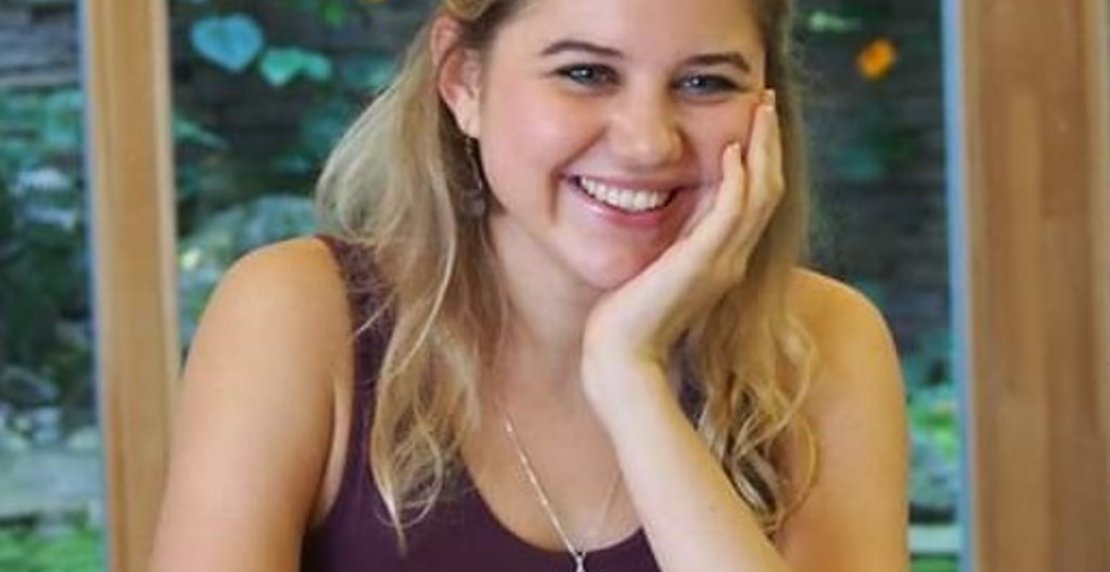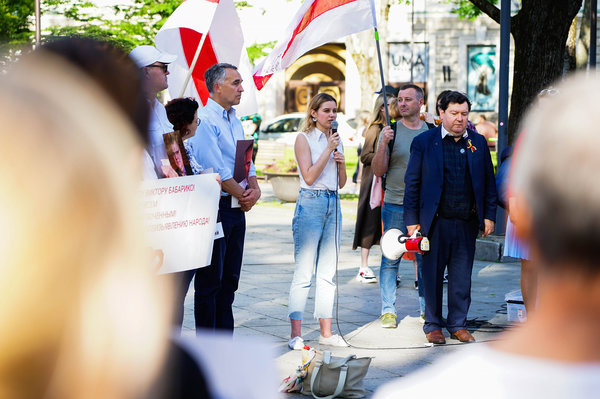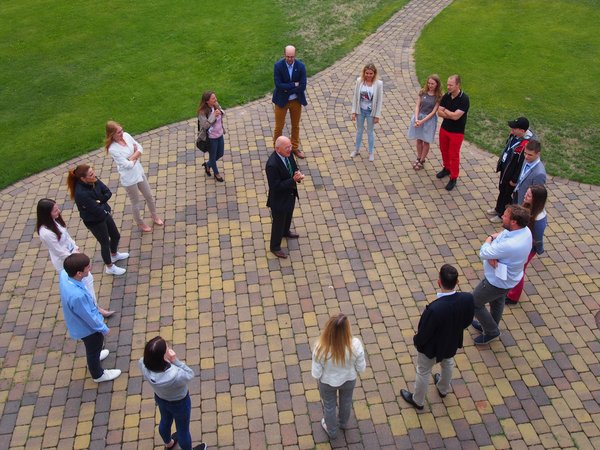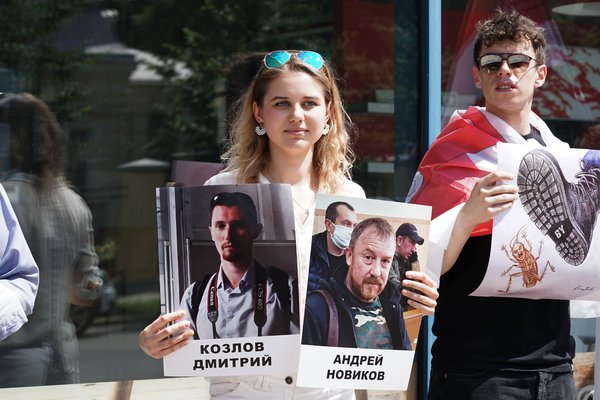
Viktoryia Andrukovic from Belarus
Tekst: Jan Mulder (EFF trainer)
Hello ! My name is Viktoryia Andrukovič and I was born in Belarus, Grodno, but moved to Lithuania to study at the Belarusian university in exile in Lithuania at the age of 17. I finished two degrees, the last one in political sciences and sociology. As a student I initiated and coordinated a charity project dedicated to work with children from disadvantaged families and orphanages of Vilnius for 4 years . Next to that, I assisted at political campaign “Tell the Truth”, where I participated in the preparation of the election campaign and assisted candidates for deputies, helped with the organization, and participated in various socio-political events. During my stay in Vilnius I was involved in work at NGO “Society of Belarusian Culture”, that works with the preservation of the Belarusian cultural and historical heritage in Lithuania. At the Society, I assisted in the organization of events, worked on their visual representation, and helped to translate different legal papers and documents.
I am also working on a voluntary basis at the Belarusian human rights organization “Human Constanta”, where I am involved in research in the field of human rights in Belarus and abroad, comparative analysis of them, analysis on the situation of human rights in the country, rights of refugees and stateless persons, discriminated groups and minorities within the framework of Belarusian and International law. I also assist the organization of educational events against discrimination, xenophobia, hatred, fascism, and antisemitism; educational activities on human rights and digital freedoms.
Before the presidential elections 2020 in Belarus, I was involved in work on a unified platform for online monitoring of the electoral process “ZUBR” located in Vilnius, but the tragic events following the presidential elections forced me to return to my homeland to work with victims of police violence. “Human Constanta” is a co-funded Committee for the Investigation of Torture Committed against Participants of Peaceful Rally in Belarus, aim of which is to collect as many facts and evidence of torture, inhuman treatment and violation of human rights as possible to bring those responsible to justice and protect the rights of victims. Within the framework of the committee, the victims are provided with legal, financial, psychological and medical assistance. I am coordinating the Grodno region in the Committee and am working with victims directly there. I got in contact with EFF during the seminars Leaders in Democracy in Vilnius in 2019.

What does democracy mean to you?
“Democracy for me is a system of governance in which there is a dialogue between people and the authorities, where their voices are listened to and heard. In a democratic state, the government is a reflection of people’s needs and values. It guarantees the safety and security of each citizen, equality, justice and liberty, pluralism of opinions and respect to them, protection of human rights and dignity.”
What developments do you see that are shaping democracy, in a positive or negative way, in your country?
“Unfortunately, Belarus is still in the handcuffs of an autocratic government that uses its repressive, oppressive and violent mechanism against people which undermines the whole concept of what democracy is. However, this year we have witnessed unprecedented changes in society and the "renaissance" of the political culture and civil society of the people which is an important step towards the establishment of a democratic state. Our nation has never been as united and consolidated as it is now, and this is already a great victory, despite the increasing use of repressive tools and violence by the government.
There were a lot of challenges - lack of response from the authorities to the COVID-19 pandemic and abusive policies towards citizens; a rapid increase in the number of political prisoners; repression against political opponents, activists, human rights defenders, independent media and journalists, and attempts to oust them from the country; violation of the electoral standards and severe falsification of the election results; violence, torture and imprisonment of participants in peaceful protests; and more. But these problems led to the awakening of political culture, the revitalization and activation of civil society, which assumed many of the functions that the government had to perform in the case of a constitutional democratic state.”

What do you like about politics and what motivates you to be active in politics?
“For me politics is one of the tools to promote democracy, liberty, equality and justice. People often accuse politicians of selfishness and hypocrisy, but I believe in honest, fair and people-centered politics that can change society for the better.
Unfortunately, political instruments in the case of Belarus are ineffective, that’s why now I am more involved in the work at the grassroots level, in the human rights organization and the committee, where I help the ones who suffered from riot police violence and where I can make a real impact on the current situation in the country.”
Of which political achievement are you most proud?
“It’s a complex question in the case of Belarus. I’m prouder of my achievements (if I can name them so) in the field of human rights and civic activism than in politics. But during the parliamentary elections, where I helped the candidates, I was really proud of what I was doing and our team, where everyone sincerely believed in positive change and in the fact that our activities matter, regardless of the fact that there is no chance of winning. I also believe that our social and civic achievements as a nation are much more valuable than any political ones.”

What is the added value of trainings (from organisations like the EFF) to your (political) development? Why is it so important that you follow these trainings?
“First of all, networking. The training gave me the opportunity to meet like-minded people, who are also active in politics and civil society like me, with whom I’m still in touch.
Secondly, new perspectives. It is extremely difficult for many Belarusians to understand how real democracy works and what life is like in a democratic society, because they often cannot afford to travel due to bureaucratic and financial issues. Therefore, these trainings show them examples from other countries, broaden their horizons and open their minds to new things.
Thirdly, inspiration. It’s always very inspiring to see what other people do and share your experience. It is very impressive to see what other people are voluntarily doing for society and people and to share your own experience with them. In addition, I was struck by the fact that the trainers were volunteers just like us, not working for the sake of money, but doing it to make the world a better place.
Fourth, knowledge and skills. Since I finished my master's degree in political science, there was nothing new for me, but for others there was a lot of new information and openings, as well as the opportunity to gain some applied skills, such as public speaking.”
What was for you the most memorable moment during the trainings?
“The most memorable were the moments when we were working in groups, presenting together the projects and sharing the joy of success. This gave us a special sense of unity and common happiness, as well as believe that together we can achieve something bigger. “
What kind of support would you, or other young people active in your country, need more?
“I think such eye-opening trainings where you can see other countries, meet amazing people all over the world, share experiences, learn new things and gain new skills are really helpful for personal and professional development. “

